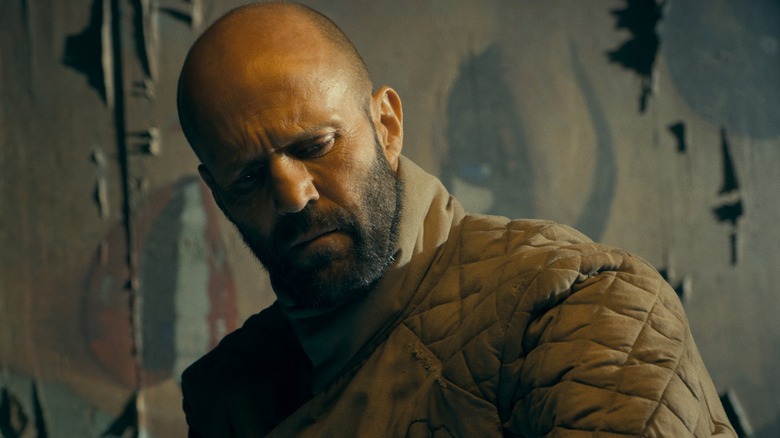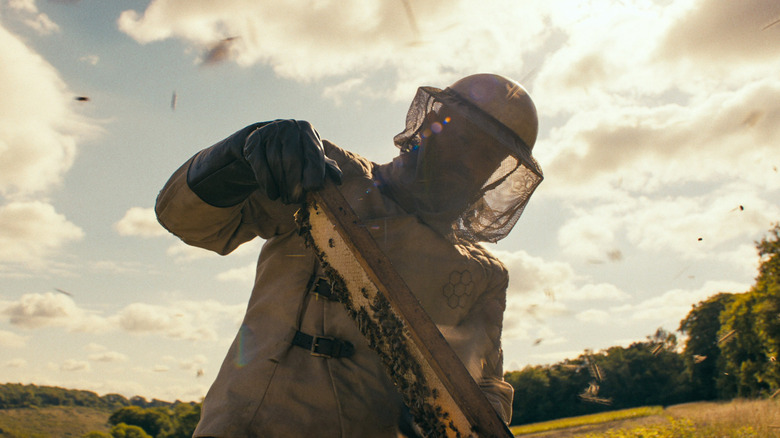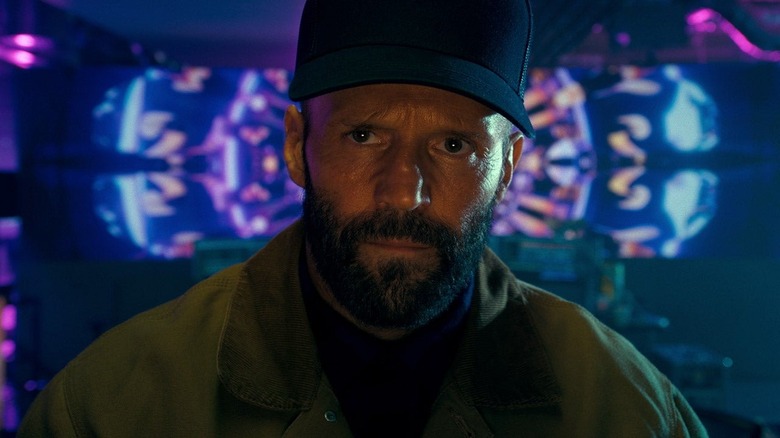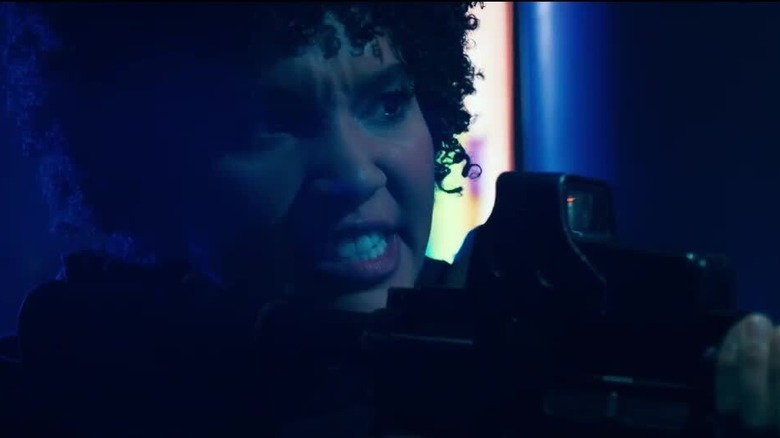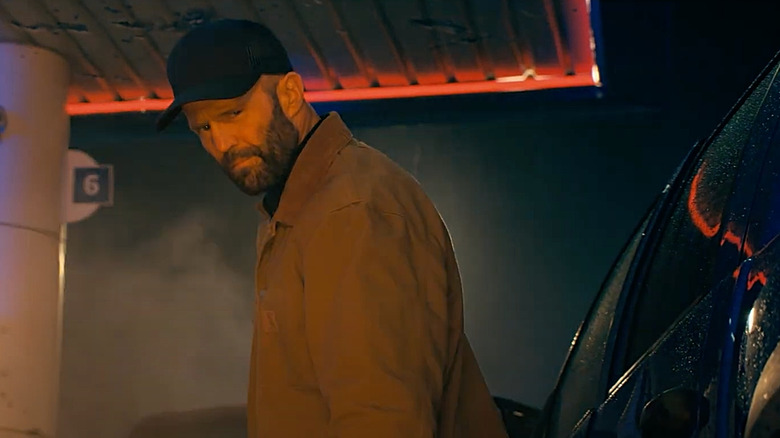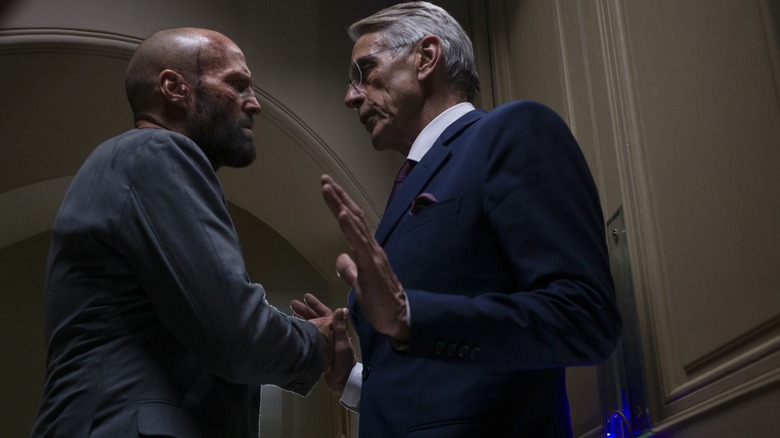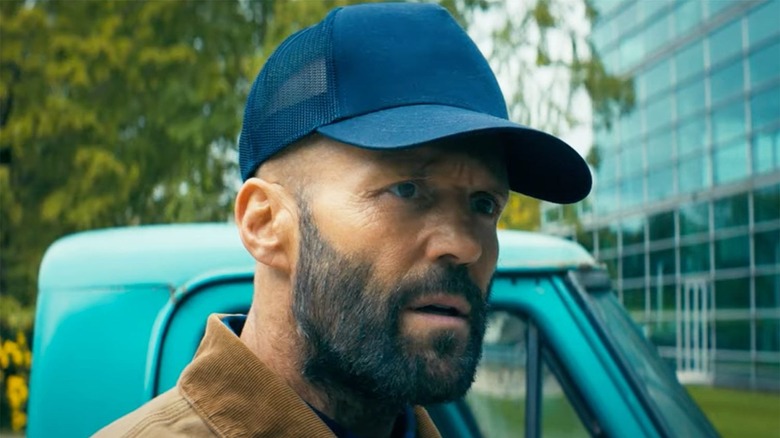The Beekeeper Ending Explained: You've Got A Friend In Bee
We all have the inherent understanding that our lives are part of a larger system, an infrastructure that's not only the one humanity has constructed for itself (government, laws, and so on) but the one that's existed for many more thousands of years: the natural ecosystem of the planet that we live on. However, it seems that our goal as human beings has been to implicitly (or explicitly, in the case of the major corporations whom we've let take control of our destinies) make our lives more relaxed, more convenient, and more catered to our every whim, with little care or understanding for how it affects everything around us.
Case in point: the honey bee. While it's general knowledge that bees are a vital part of our ecosystem and their populations are declining (due in large part to climate change), it's also true that not enough is being done to help stop it. The action genre, when boiled down to its core essence, is about overcoming injustice: whether action heroes are on a mission of revenge for an unforgivable deed or one of preventing potential disaster, their ethos is rooted in righting wrong.
"The Beekeeper" is the latest in a series of recent action films facing this ethos head-on. Whether it's the wish-fulfillment of audiences hoping they could eradicate the systemic issues of the world themselves or that someone out there could do so on their behalf, this new film from director David Ayer, writer Kurt Wimmer, and star Jason Statham seeks to provide just such a power fantasy. As such, there are bullets, blood, and butt-kicking a-plenty as Statham's titular Beekeeper fights to balance the scales of justice. The film also throws in a good helping of bee puns to help the social commentary go down smoothly like honey (See? Like that).
The unbearable lightness of bee-ing
As a film, "The Beekeeper" has an arc that is not only dramatically sound (insofar as it begins simply and escalates with each passing scene) but recalls several social justice-motivated action characters, from Billy Jack in "The Born Losers" to John Rambo in "First Blood" to Robert McCall in "The Equalizer." Adam Clay (Statham) lives on a large farm in rural Massachusetts, one that's owned by the kindly Eloise Parker (Phylicia Rashad). In his 40s, Adam seems to be retired, resigned to a pleasant existence keeping bees on Eloise's property. The older woman enjoys him living in her barn, especially as he loves and enjoys his craft; as the film demonstrates early on when Adam electrocutes a nest of hornets, Clay has no qualms about culling the problematic elements that arise in order to protect his hives.
Sadly, this idyllic existence is brought to a crashing halt when Eloise is made the victim of an insidious phishing scam, a warning message on her computer telling her to contact a call center run by Mickey Garnett (David Witts). After Garnett, posing as a representative for anti-virus software, convinces Eloise to wire him her banking information, he and his outfit drain her accounts completely dry — especially and including the account she helped manage for a charity. After Eloise realizes what's happened, she shoots herself just before Clay arrives with a gift jar of honey for her. As Clay is caught at the scene by Eloise's FBI Agent daughter, Verona (Emmy Raver-Lampman), he's instantly a suspect.
Hive mind
Fortunately, cooler heads prevail, and Clay is exonerated of murdering Eloise. Verona admits her aggressive finger-pointing at him was partially out of her own guilt, as she's been estranged from her mother for years after the loss of her brother during his military service. During a conversation with Verona, Clay learns of Eloise's heartbreak after the phishing scam, and he begins remarking about how he must "protect the hive." At first, Verona believes he's just referring to his actual beehives, but the fact that a background search of Clay only turned up a social security number and not much else makes her suspicious.
Turns out that Verona's intuition is correct: Clay used to belong to a super-secret black ops organization known as the Beekeepers, a group that operates with impunity and is ranked above every major law enforcement or government organization in the country. Calling in a favor from an old colleague of his, Clay tracks down Garnett and his call center, paying them a visit with two cans full of gasoline. Upon fighting his way into the building, Clay offers the employees a one-time chance to escape with their lives as he pours gas all around the office and then hooks up an explosive device to the phone system, meaning that the next phishing scam to reel in bait with a call will set off the bomb. It doesn't take long for just that to happen, and the entire building is set ablaze.
Becoming buzzworthy
The humiliated Garnett contacts his employer, the sleazy twenty-something tech entrepreneur Derek Danforth (Josh Hutcherson), an executive at the respectable and successful Boston-based business, Danforth Enterprises. Upon learning of Clay and what he's done to one of his data mining branches, Derek orders Garnett to use his underworld connections to seek out Clay and whack him. Garnett tracks down Eloise's farm and spots Clay there, choosing to attack him with his gang of several men. Of course, Clay's Beekeeper skills are no match for these criminal goons, and soon enough Eloise's farm is burning to the ground itself.
As Verona and her FBI partner, Matt (Bobby Naderi), investigate the aftermath of the incident, Verona ironically recalls losing her virginity in the barn that's now been burned to a crisp, writing off the loss of her childhood home as something more factual than tragic. This is an important tonal key Ayer and Wimmer are hitting: Clay's work isn't clean, he's not a magical character who's going to wash the Evil away and reward the Good. He's instead seen as a necessary force of nature, almost like an act of God.
Speaking of all things Biblical, Clay leaves Garnett for last, "Commando"-style, making the sleazebag call Derek before tying the criminal to his truck and sending it careening over a bridge. Clay informs Derek that he's coming his way, and a worried Derek runs to Wallace Westwyld (Jeremy Irons), the former head of the CIA who now works privately for Danforth. When Westwyld discovers that Clay is a Beekeeper, he's already presuming Derek is a dead man. That is, until he learns from the current CIA director, Janet (Minnie Driver), that Clay is actually retired from the organization, meaning that the current active Beekeeper is going to be sent after the rogue Clay.
A taste of honey
While refueling Garnett's car at a gas station, Clay is attacked by the current Beekeeper, Anisette (Megan Le), an assassin who is just as dangerous but ten times more unhinged than Clay is. With her vibrant purple outfit, punk-style hairdo, and outrageous attitude, Anisette feels like a character out of a Luc Besson movie, akin to someone from Joe Carnahan's "Smokin' Aces" or Ayer's own troubled "Suicide Squad." Given that she obviously enjoys her job a little too much, Clay can maneuver around her, taking her out and the gas station along with her. Although the film doesn't make a big point of the substance he uses to burn Anisette alive (not as much as the trailer does, anyway), it's appropriately Bee-themed: honey, a symbolic substance that recalls the way bees and other members of the insect world can turn on each other ruthlessly yet dispassionately.
As Verona and Matt pick up Clay's trail of destruction, they observe that he's headed toward Boston, and begin to put the pieces together of who it is he's targeting. While Verona and the FBI have been after these data mining outfits for a long while, Clay has cut through all the bureaucratic red tape, leading Matt to wonder aloud (and Verona to wonder silently) whether they shouldn't just stand back and let the Beekeeper do his work.
Drone warfare
Meanwhile, Westwyld has hired a posse made up of elite mercenaries, people who are unstoppable killers in every fight imaginable. Except, of course, when it's with a Beekeeper, meaning Westwyld only hopes that they can distract Clay long enough to get lucky and take him out by chance, something he vocalizes to the group openly.
As Westwyld predicted, his team of mercs are mercilessly and efficiently taken out when Clay turns up at the prime call center hub in Boston, taking the manager Rico (Enzo Clienti) and stapling his face and hands until he gives up the name of his employer, Derek. Verona and Matt arrive on the scene and try to get the drop on Clay, but the reverse happens instead, with Clay disarming but not injuring Matt. When Verona discovers Derek's connection to the data mining operation, she suddenly understands the entire picture of what they're up against and what Clay might be headed toward: Derek's mother, the former CEO of Danforth Enterprises, is now the President of the United States of America.
Knowing that Clay lives his life dedicated to preserving the hive and emulating the behavior of bees, Verona discovers that there is such a thing in bee culture as a "queen slayer," a worker bee who can rise up and kill their queen if she fails to produce the right kind of male offspring. Knowing that Clay has no problem with burning down the system to set it right, she tells the head of the FBI, Prigg (Don Gilet), that she suspects Clay is gunning for the President.
God save the queen
President Danforth (Jemma Redgrave) is apparently a fairly tired and jaded woman with her share of regrets. She half-heartedly expresses some romantic interest in Westwyld as she tries to coax him to protect her son, and later, she defeatedly watches Derek openly snort coke in front of her. At first, it's not made clear how much, if anything, she knows about her son's data mining scheme. What is clear is that, once she learns that a Beekeeper is after him, she's not altogether surprised.
Attempting to sequester Derek at their beachside mansion during a private social event, Danforth allows Westwyld to hire the film's most colorful mercenary, Lazarus (Taylor James), who reveals he once fought a Beekeeper and lived, even though he suffered the loss of his leg. When Clay infiltrates the mansion party, Verona is the first to spot him (or did Clay reveal himself to her intentionally?), and soon Clay is surrounded. As Lazarus is given the order to execute Clay then and there by Westwyld, Verona is appalled at this blatant subversion of the law. After delivering a slick, "Hamlet"-referencing one-liner, however, Clay shoots Lazarus through the face and escapes, fighting his way through the rest of the mansion up to the room where the President and Derek are being guarded.
Lazarus proves his namesake by being a hard man to kill, and he has a duel to the death with Clay in a long, mirrored hallway that recalls the finales of both "Enter the Dragon" and "John Wick Chapter 2," the men using all those tricky reflections and shattered glass to their deadly advantage. Eventually, the Beekeeper is wounded but emerges victorious.
A reason to bee-lieve
As he sees a reckoning coming his way in the form of Clay, Derek confesses that he had Westwyld give him CIA-manufactured software intended to track down terrorists and switched it to track down money instead, using the algorithm to set up his data mining/phishing operation and raise funds for his mother's election campaign. President Danforth is genuinely shocked to hear this, proving that she was at least not involved in her son's evil scheme. She declares to Derek that she'll tell everyone the truth about her campaign and his actions, no matter the consequences. Upon this revelation, Derek murders Prigg and holds his own mother hostage just as Clay enters the room with Verona close behind.
With her sights set on Clay, the Beekeeper offers the daughter of the woman who helped him ("The only one who took care of me," as Clay continually describes Eloise) a choice: the law or justice. Verona backs off long enough for Clay to shoot Derek through the head just as the boy is about to kill more people. Leaping out of a nearby window, Clay heads for the ocean, and Verona allows him to get away. Still bleeding, Clay retrieves a diving suit that he'd planted on the beach and puts it on, absconding into the sea as a lone bee wafts through the air.
Ayer and Wimmer purposefully don't provide any sort of denouement to the film; it's not revealed whether President Danforth keeps her office or is compelled to step down, what happens to the Beekeeper organization, nor what happens to Clay himself. While these threads may be left dangling in the hopes of a sequel, it's more likely that Ayer wished to make the film an anti-establishment parable that's as determinedly single-minded as Adam Clay: the unfavorable male offspring is eradicated, the hive protected, the corrupt system dismantled. Now nature will rebuild, and the scales can balance again. A fantasy, perhaps, but then again, bees are real. Let's hope we all can keep a world that's worthy of them.
